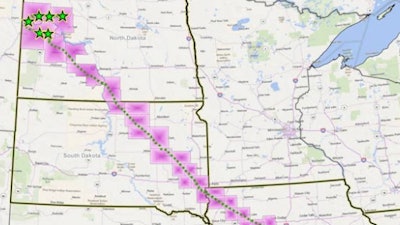
DES MOINES, Iowa (AP) — The Des Moines Register reports the landowners are trying to keep the pipeline company from being able to use eminent domain powers to secure access to their land for the project.
Houston-based Dakota Access LLC wants to build the pipeline from northwest North Dakota to a storage facility in south-central Illinois. The pipeline would transport up to 570,000 barrels of crude oil a day from the Bakken oil field in western North Dakota.
Construction has begun in North Dakota, South Dakota and Illinois, but the Iowa Utilities Board has not authorized work to begin. And the U.S. Army Corps of Engineers hasn't yet issued permits for the project.
Dakota Access officials have said the company will work with regulators to move forward with construction of the pipeline in Iowa.
Lawyer Bill Hanigan, who represents both couples that sued on Friday, said the landowners hope the court will block Cherokee County proceedings to set the value of the land Dakota Access wants to build the pipeline on. County officials are set to meet June 13.
"Landowners have begun receiving notices of the county compensation meetings," Hanigan said in a prepared statement. "Unless suspended, the meetings will result in Dakota Access taking possession of the farmland. We are asking Iowa's courts to suspend these actions until after a full hearing on the merits of each landowner's case."
The lawsuits argue that because Dakota Access is not a utility, it should not be able to use eminent domain to force landowners to sell access to their land for the project. Eminent domain is the power governments use to take private property for a public purpose in return for fair-market compensation.
A separate lawsuit filed in Polk County argues that the Iowa Utility Board shouldn't have approved eminent domain authority for the pipeline.
The Corps of Engineers is reviewing the proposed pipeline project because it would cross the Missouri and Mississippi rivers. Officials have said that the Corps will likely decide on those permits within the next 60 to 120 days.






















